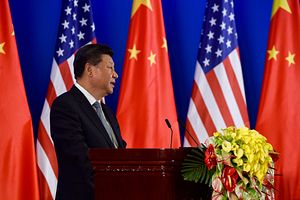On Saturday, the Trump administration issued a strongly worded statement condemning recent guidance from the Chinese Civil Aviation Administration to foreign airlines.
The letter, which was sent to 36 foreign airlines and acquired by the Washington Post‘s Josh Rogin, demanded that these airlines correctly reference Taiwan, Hong Kong, and Macao on their websites and in their promotional materials.
“This is Orwellian nonsense and part of a growing trend by the Chinese Communist Party to impose its political views on American citizens and private companies,” the White House statement notes.
“China’s internal Internet repression is world-famous. China’s efforts to export its censorship and political correctness to Americans and the rest of the free world will be resisted,” it adds.
The White House’s statement, issued by Press Secretary Sarah Huckabee Sanders, also framed criticism of the Chinese directive in terms of President Donald Trump’s campaign against “political correctness in the United States,” calling the Chinese statement an example of “efforts by the Chinese Communist Party to impose Chinese political correctness on American companies and citizens.”
In recent months, various non-Chinese companies, including Mercedes Benz and Marriott Hotels, have been at the center of controversies involving the Chinese government. Marriott fired a social media employee who, while logged into the company’s official Twitter account, “liked” a post from a Tibetan separatist group applauding the hotel chain for listing Tibet as a separate country on its website.
In February, Mercedes Benz issued an apology to the Chinese government for hurting “the feelings” of the Chinese people for sharing a quotation from the Dalai Lama on the company’s official Instagram account.
Saturday’s White House statement is the strongest official U.S. response to the Chinese Communist Party’s imposition of speech standards on foreign firms. “The United States strongly objects to China’s attempts to compel private firms to use specific language of a political nature in their publicly available content,” the statement added.
The White House’s latest statement was released as a high-level U.S. trade delegation, led by U.S. Treasury Secretary Steve Mnuchin, wrapped up a visit to China. The trade delegation was not received by Chinese President Xi Jinping or Vice President Wang Qishan, echoing Trump’s decision to not meet with Chinese Vice Premier Liu He during his visit to Washington, DC, in March.
Trade tensions between the two countries remain high following the Trump administration’s decision to explore $100 billion in tariffs against China after approving new tariffs on $50 billion in Chinese goods over what the administration said was China’s theft of U.S. intellectual property. China repsonded to those U.S. tariffs with reciprocal moves of its own.
































